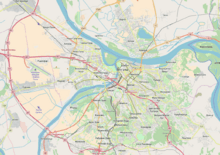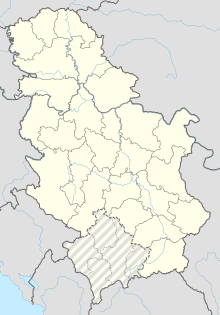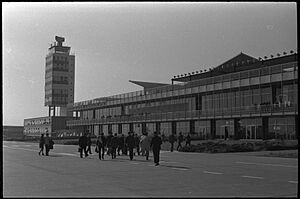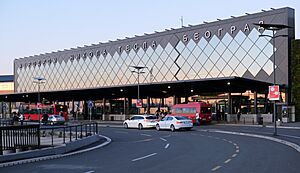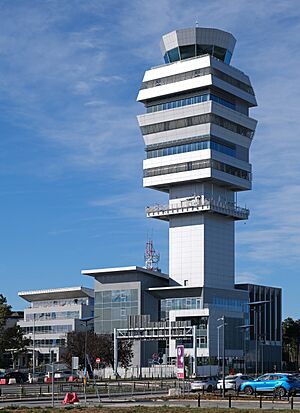Belgrade Nikola Tesla Airport facts for kids
Quick facts for kids
Belgrade Nikola Tesla Airport
Аеродром Никола Тесла Београд
Aerodrom Nikola Tesla Beograd
|
|||||||||||||||
|---|---|---|---|---|---|---|---|---|---|---|---|---|---|---|---|
 |
|||||||||||||||
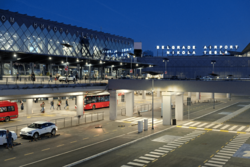 |
|||||||||||||||
| Summary | |||||||||||||||
| Airport type | International | ||||||||||||||
| Owner | Government of Serbia | ||||||||||||||
| Operator | VINCI Airports Serbia d.o.o. | ||||||||||||||
| Serves | Belgrade | ||||||||||||||
| Location | Belgrade, Serbia | ||||||||||||||
| Hub for | Air Serbia | ||||||||||||||
| Elevation AMSL | 336 ft / 102 m | ||||||||||||||
| Coordinates | 44°49′10″N 20°18′25″E / 44.81944°N 20.30694°E | ||||||||||||||
| Website | beg.aero | ||||||||||||||
| Map | |||||||||||||||
| Runway | |||||||||||||||
|
|||||||||||||||
| Statistics (2024) | |||||||||||||||
|
|||||||||||||||
|
Source: Vinci Airports Press Release
|
|||||||||||||||
Belgrade Nikola Tesla Airport is a big international airport that serves Belgrade, the capital city of Serbia. It is the largest and busiest airport in Serbia. The airport is located about 18 kilometers (11 miles) west of downtown Belgrade, near a suburb called Surčin.
The airport is named after Nikola Tesla, a famous Serbian-American inventor. It is operated by a French company called Vinci Airports. Air Serbia, which is the main airline of Serbia, uses this airport as its main base. Another airline, Wizz Air, also has an operating base here.
Contents
History of Belgrade's Airports
Early Airfields in Belgrade
The very first airfield in Belgrade opened in 1910 in a neighborhood called Banjica. It was used by early pilots. A wooden hangar was built there in 1912 for the Serbian Air Force. This airfield was also used for mail flights after World War I.
Another early airfield was opened in 1911 near the Kalemegdan Fortress.
Pančevo Airport
An airport near Pančevo, a town northeast of Belgrade, started operating in 1923. It was part of an international route from Paris to Istanbul. This airport was also used by the Royal Yugoslav Air Force for training.
Dojno Polje Airport (New Belgrade)
Because the Pančevo airport was far from Belgrade, a new airport was built closer to the city. It opened on March 25, 1927, and was called Belgrade International Airport. The first local airline, Aeroput, started flying from here in 1928.
This airport had four grass runways. A modern terminal building was added in 1931. Before World War II, many international airlines used this airport, connecting Belgrade to major cities like London, Paris, and Istanbul.
German forces used the airport during World War II. It was bombed by the Allies in 1944. The German army destroyed the remaining parts when they left. The airport was rebuilt quickly and used for military flights. Civilian flights started again in 1945.
As air travel grew, a bigger airport was needed. Also, the area where the old airport was located was planned for a new part of the city called Novi Beograd. So, a decision was made to build a completely new international airport.
The Current Airport in Surčin
The new airport was built on the Surčin plateau, about 15 kilometers (9 miles) from Belgrade's city center. Construction began in April 1958. The airport officially opened on April 28, 1962, by President Josip Broz Tito.
It had a 3,000-meter (9,800-foot) long runway and a large passenger terminal. Modern navigation equipment was installed, giving the airport a high international rating.
The airport faced difficulties in the 1990s due to wars and international sanctions against Serbia. Air travel was banned, and the airport had very few passengers. Many parts of the airport needed repairs.
After 2001, normal air traffic returned. In 2005, the runway was upgraded to help planes land safely in bad weather like fog. In 2006, the airport was renamed Belgrade Nikola Tesla Airport.
Recent Developments and Upgrades
From 2012 onwards, the airport underwent major modernization and expansion. This included making the departure and transit areas larger. Jetways, which are the bridges connecting the terminal to the airplane, were also replaced.
In January 2018, the Serbian government gave a 25-year agreement to the French company Vinci Airports to operate the airport. Vinci officially took over the airport on December 21, 2018. The agreement was extended until July 1, 2044.
Airport Terminals
Belgrade Nikola Tesla Airport has two main terminal buildings, Terminal 1 (T1) and Terminal 2 (T2). They are connected by a hallway. The airport has 90 check-in counters and 32 gates. Many gates have jetways for passengers to board planes directly.
Terminal 1
Terminal 1 was the first and only terminal when the airport opened. It used to handle flights within Yugoslavia and Serbia. Now, it is mostly used by low-cost airlines and charter flights. The inside of Terminal 1 was completely updated in 2016 and 2017.
Terminal 2
Terminal 2 was built in 1979 because more and more passengers were using the airport. It can handle up to 5 million passengers. This terminal has airline offices, transfer desks, and shops. Terminal 2 was renovated twice, once from 2004 to 2006 and again in 2012 and 2013.
Airlines and Destinations
Passenger Flights
Many airlines fly to and from Belgrade Nikola Tesla Airport. Here are some of the airlines and the cities they fly to as of July 2025:
| Airlines | Destinations |
|---|---|
| Aegean Airlines | Athens |
| Air Cairo | Hurghada |
| Air Montenegro | Podgorica, Tivat |
| Air Serbia | Amsterdam, Ankara, Athens, Banja Luka, Barcelona, Bari, Berlin, Bologna, Brussels, Bucharest–Otopeni, Budapest, Chicago–O'Hare, Copenhagen, Düsseldorf, Frankfurt, Florence, Geneva, Gothenburg, Guangzhou, Hamburg, Hannover, Istanbul, Kazan, Kraków, Larnaca, Lisbon, Ljubljana, London–Heathrow, Lyon, Madrid, Málaga, Malta, Milan–Malpensa, Moscow–Sheremetyevo, Mostar, Naples, New York–JFK, Nice, Niš, Nuremberg, Oslo, Paris–Charles de Gaulle, Podgorica, Porto, Prague, Rome–Fiumicino, Saint Petersburg, Salzburg, Sarajevo, Shanghai–Pudong, Skopje, Sochi, Sofia, Stockholm–Arlanda, Stuttgart, Tbilisi, Thessaloniki, Tirana, Tivat, Valencia, Venice, Vienna, Zagreb, Zürich Seasonal: Alghero, Catania, Chania, Corfu, Dubrovnik, Heraklion, Izmir, Mykonos, Ohrid, Palermo, Palma de Mallorca, Pula, Rhodes, Rijeka, Split, Varna, Zadar Seasonal charter: Antalya, Bodrum, Dalaman, El Dabaa, Hurghada, Kavala, Kefalonia, Marsa Matruh, Monastir, Preveza/Lefkada, Sharm El Sheikh, Skiathos, Zakynthos |
| AJet | Ankara, Istanbul–Sabiha Gökçen, Izmir |
| Arkia | Tel Aviv |
| Austrian Airlines | Vienna |
| China Southern Airlines | Guangzhou |
| easyJet | Geneva, Paris–Charles de Gaulle (begins 27 October 2025) |
| Eurowings | Seasonal: Düsseldorf |
| flydubai | Dubai–International |
| Hainan Airlines | Beijing–Capital |
| KLM | Amsterdam |
| LOT Polish Airlines | Warsaw–Chopin |
| Lufthansa | Frankfurt, Munich |
| Norwegian Air Shuttle | Oslo |
| Nouvelair | Seasonal charter: Djerba, Monastir |
| Pegasus Airlines | Istanbul–Sabiha Gökçen |
| Qatar Airways | Doha |
| Sky Express | Seasonal charter: Heraklion, Rhodes |
| Sundor | Tel Aviv |
| Swiss International Air Lines | Zürich |
| TAROM | Bucharest–Otopeni |
| Turkish Airlines | Istanbul |
| Wizz Air | Alicante, Barcelona, Basel/Mulhouse, Beauvais, Bergamo, Berlin, Copenhagen (ends 25 October 2025), Dortmund, Eindhoven, Friedrichshafen, Gothenburg, Hamburg, Karlsruhe/Baden-Baden, Larnaca, Lisbon, London–Luton, Madrid (begins 28 October 2025), Malmö, Malta, Memmingen, Nice, Rome–Ciampino, Stockholm–Skavsta Seasonal: Heraklion |
Cargo Flights
Cargo airlines also use Belgrade Nikola Tesla Airport to transport goods. Here are some of them:
| Airlines | Destinations |
|---|---|
| Cargoair | Linz |
| DHL Aviation | Leipzig/Halle, Milan–Malpensa |
| Turkish Cargo | Istanbul |
| YTO Cargo Airlines | Aktobe, Ürümqi |
Airport Services
Security at the Airport
Belgrade Nikola Tesla Airport has security checks to keep everyone safe. Since 2021, there is a main security area where all passengers are screened before they go to their gates.
Passport control for people leaving is on the first floor of Terminal 2. For people arriving, it's on the ground floor. In December 2024, new electronic gates (eGates) were added for faster passport checks. There are 10 eGates for departures and 10 for arrivals.
Lounges for Passengers
The airport has special lounges where passengers can relax before their flights.
- The "Business Club" lounge is for business class passengers. It opened in 2011.
- There is also a VIP Lounge with its own check-in and passport control. This lounge is very private.
- Air Serbia has its own "Air Serbia Premium Lounge" for its premium passengers. It is located between gates A4 and A5. Air Serbia plans to open a new, larger Premium Lounge near gate C10 by the end of 2024.
Getting To and From the Airport
By Car
The airport is connected to the A3 motorway, making it easy to reach by car. Taxis are also available to take you to the city.
By Bus
Several bus lines connect the airport to different parts of Belgrade:
- Line A1 goes to Slavija Square.
- Line 72 goes to Zeleni Venac.
- Line 600 goes to Belgrade Centre railway station.
- Line 607 goes to Banovo Brdo.
- Line 860i goes to Belgrade Bus Station and Barič.
By Train
The Serbian government has announced plans to build a new railway line connecting the city and the airport. Construction was scheduled to start in 2024.
Airport Incidents
- On February 18, 2024, an Air Serbia plane (Flight 324) was taking off for Düsseldorf. It hit the airport's instrument landing system equipment, causing damage to the plane. The aircraft returned safely to the airport, and everyone on board was evacuated.
More to Explore
- Aeronautical Museum Belgrade
- List of airlines of Serbia
- List of airports in Serbia
See also
 In Spanish: Aeropuerto de Belgrado-Nikola Tesla para niños
In Spanish: Aeropuerto de Belgrado-Nikola Tesla para niños
 | Aaron Henry |
 | T. R. M. Howard |
 | Jesse Jackson |


